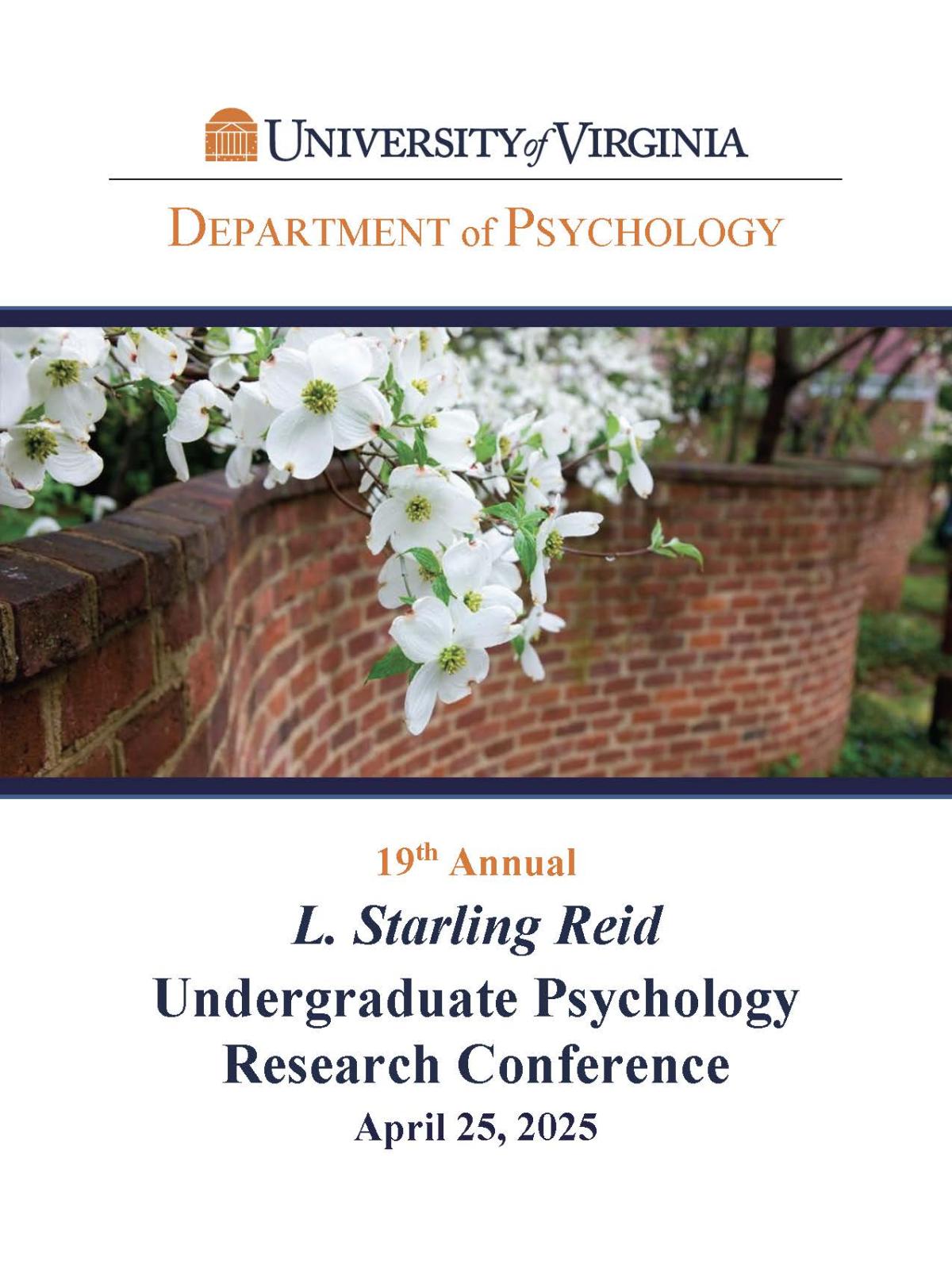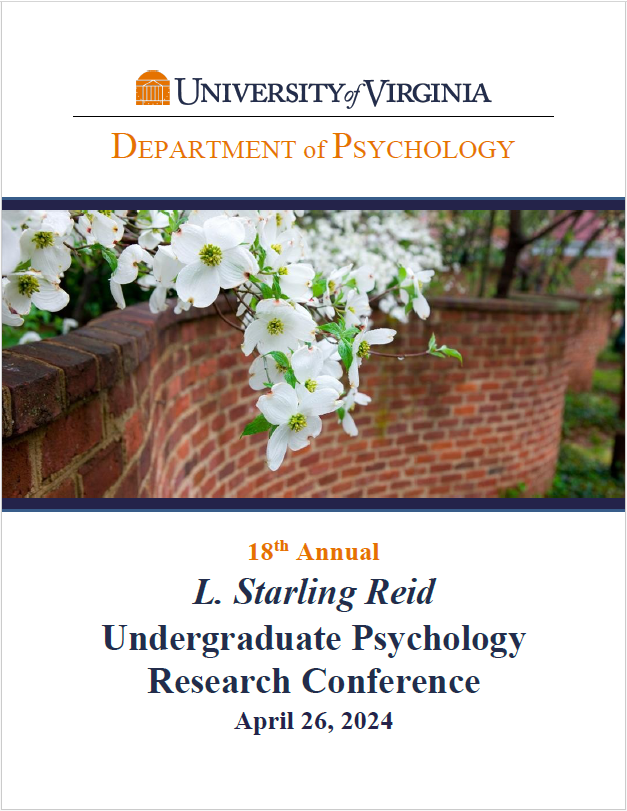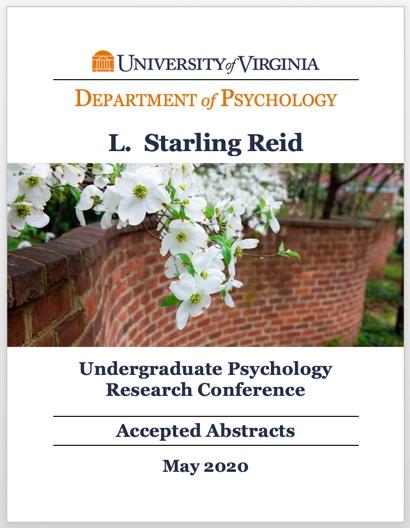- Undergraduate
- Graduate
- Research
- People
- Connect
Reid Conference
The annual L. Starling Reid Undergraduate Psychology Research Conference at the University of Virginia highlights empirical research conducted by undergraduate scholars from throughout the nation. Presentation formats are oral presentations and posters.
Conference Information
The 20th annual L. Starling Reid Conference will be held on Friday, April 17, 2026. The full schedule for the day will be posted soon.
Location: Ern Commons
Proposal Application
Application Deadline: Monday, March 16, 2026
Note: If you intend to apply to present a poster as a group, please elect one person to submit the proposal. This individual will be the primary point of contact for your group.
Final Abstract and Poster Deadline: Thursday, April 9, 2026
Note: Proposals require an abstract, but not completion of data collection. Abstracts may be revised after the initial proposal upon data collection.
Final Presentation Slides Deadline: Monday, April 13, 2026
Visitor Parking
Parking Map
Central Grounds Garage
The Central Grounds Garage is conveniently located under the University Bookstore at 400 Emmet Street, and is near Newcomb Hall, Memorial Gymnasium, Brown College, and the Clemons Library. Hourly parking may be paid via the ParkMobile app.
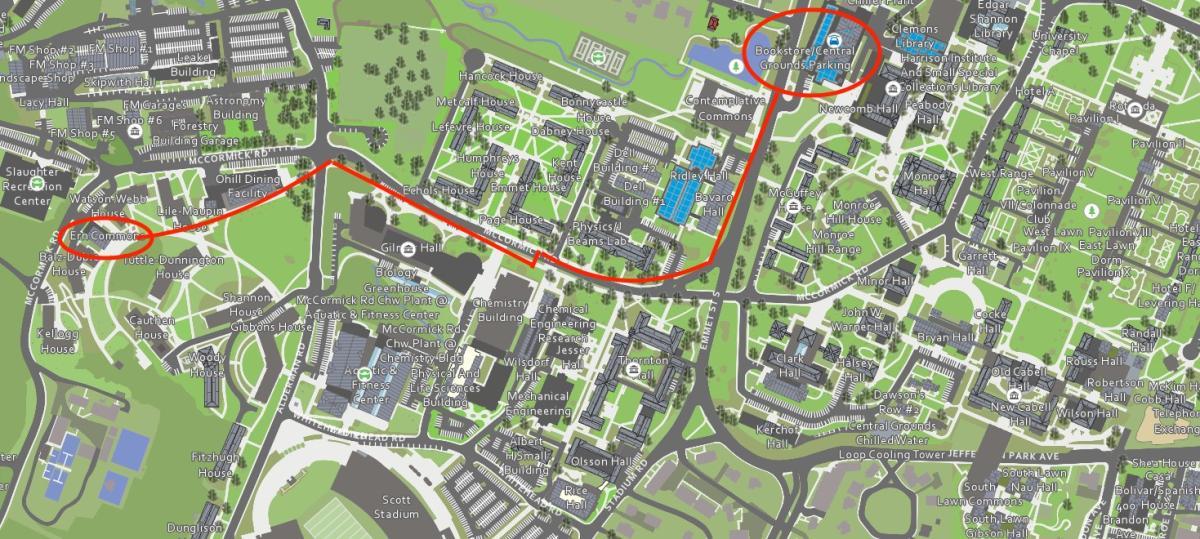
Proposal Submission Information
Abstract Guidelines
Please follow American Psychological Association style guidelines closely. Abstracts are not to exceed 250 words and the research should be independent student research. Your faculty advisor should not be listed as a coauthor, but should be included on a separate line.
See the example below:
- American Children: Associations with Internalizing and Externalizing Behaviors
- Jane Smith
- Advisor: Emory L. Jones, Ph.D.
- Grandest University
Childrens' emotion regulation ability has been shown to influence psychosocial development, but this research has relied primarily on data from Western cultures. Given the important influence of culture and context on emotion processes, the current study examined emotion regulation and its associations with internalizing and externalizing behaviors in Ghanaian and American youth. Participants were 142 children from Ghana and 147 children from the United States, ages 8-15, who completed questionnaires assessing the coping, inhibition, and dysregulation of sadness and anger, frequency of emotion experiences, presence of depressed mood, and aggressive behavior. Regression analyses indicated that sadness and anger regulation do predict uniquely to depressive and aggressive behaviors in both.
Eligibility for Presentation (Talk or Poster)
- Students applying to present research must be currently enrolled as an undergraduate student.
- Presentation content should bear on psychological theory and involve empirical analysis.
- Data analysis does not need to be completed upon applying
- A final abstract deadline will be set for those who would like to make revisions upon data collection.
- If you apply to present a talk and are not selected, you will automatically be considered to present a poster.
Information on Talks
- Talks are individual oral presentations given by undergraduate students.
- Talks should be planned to last ~10 minutes, followed by ~3 minutes of questions.
- Talks should be accompanied by a professional slideshow to guide the flow of the presentation.
- Visit the Office of Undergraduate Research for oral presentation tips.
Information on Posters
- If you intend to present a poster as a group, please elect one person to submit the proposal – this individual will be the primary point of contact for your group.
- Posters are required to be printed in 36 x 48 format
- Presenters will be assigned a number indicating their poster location in the venue.
- Applicants for a poster presentation should have their name listed on only one poster.
- A poster deadline will be set close to the conference date for those who would like us to print their poster (limit to one per group).
- Visit the Office of Undergraduate Research for poster presentation tips.
Past Participating Schools
- Alcorn State University
- Bates College
- Boston College
- Brandeis University
- Campbell University
- Christopher Newport University
- Clemson University
- College of William & Mary
- Cornell University
- Dixie State University
- Duke University
- Fordham University
- George Mason University
- George Washington University
- Hollins University
- James Madison University
- Longwood University
- Loyola University Maryland
- Mary Baldwin University
- Meredith College
- New York University
- Northwestern University
- Ohio State University
- Old Dominion University
- Pennsylvania State University
- Rochester University
- Saint Louis University
- St. John's University
- Saint Mary's College of California
- St. Mary's College of Maryland
- Stonehill College
- Sweet Briar College
- Syracuse University
- University of California Santa Barbara
- University of Hawaii
- University of Maryland
- University of North Carolina at Chapel Hill
- University of Virginia
- University of Washington
- Vanguard University of Southern California
- Virginia Commonwealth University
- Virginia Polytechnic Institute and State University
- Washington & Lee University
- Yeshiva University
Questions
If you have any questions, please contact psych-info@virginia.edu.
Past Conferences
2025
Conference Schedule
- 8:45-9:15 Registration and Refreshments
- 9:15-9:20 Welcoming Remarks: Chris Mazurek, Ph.D.
- Director of Undergraduate Studies in Psychology
- University of Virginia
- 9:25-11:00 Oral Presentations I
- Shirley Mingye Li
- Lauren Lee
- Anna Lobner
- Bettina Wagner
- Oluwatoni Ikhile
- Emily Mortman
- 11:10-12:00 Poster Session I
- 12:00-1:00 Lunch
- 1:10-2:00 Poster Session II
- 2:10-3:50 Oral Presentations II
- Divya Lobo
- Gianna Latorre
- Cecile Xu
- Sam O’Brien
- Diana Park
- 3:55-4:00 Appreciation Remarks: Chris Mazurek, Ph.D.
2024
Conference Schedule
- 8:45-9:15 Registration and Coffee
- 9:15-9:20 Welcoming Remarks: Chris Mazurek, Ph.D.
- Director of Undergraduate Studies in Psychology
- University of Virginia
- 9:25-11:00 Oral Presentations I (12-13 minutes each)
- Emily Davis
- Jacob Moore
- Katerina Scott
- Madeleine Ames
- Boris Nakashyan
- 11:10-12:00 Poster Session I
- 12:05-1:00 Lunch Break
- 1:10-2:00 Poster Session II
- 2:10-3:45 Oral Presentations II (12-13 minutes each)
- Hope Keller
- Emily Eppard
- Sara Ibrahim
- Lexie Xirui Li
- Haylee Ressa
- Appreciation Remarks: Chris Mazurek, Ph.D.
2023
Conference Schedule
- 7:30-8:30 Registration and continental breakfast [Location: Newcomb Hall Commonwealth Room]
- 8:30-8:45 Welcoming Remarks: Chris Mazurek, PhD | Director of Undergraduate Studies, UVA Psychology [Location: Newcomb Hall Commonwealth Room]
- 8:45-10:15 Oral Presentations I (4 student presenters) [Location: Newcomb Hall Commonwealth Room]
- 10:30-11:30 Poster Session I [Location: Newcomb Hall South Meeting Room]
- 11:30-12:30 Lunch Break
- 12:30-1:30 Poster Session II [Location: Newcomb Hall South Meeting Room]
- 1:45-3:00 Oral Presentations II (4 student presenters) [Location: Newcomb Hall Commonwealth Room]
- 3:20-3:30 Appreciation Remarks: Chris Mazurek, PhD | Director of Undergraduate Studies, UVA Psychology [Location: Newcomb Hall Commonwealth Room]
- 3:30-4:30 Keynote Lecture: Angela Gutchess, PhD, Professor of Psychology, Brandeis University | How do Culture and Age Affect Memory [Location: Newcomb Hall Commonwealth Room]
Keynote: Angela Gutchess, PhD | How do Culture and Age Affect Memory?

Professor of Psychology and Volen National Center for Complex Systems
Brandeis University
https://www.brandeis.edu/gutchess/
Angela Gutchess’s research investigates the influence of age and culture on memory and social cognition using behavioral, neuroimaging, and patient methods. She attended Boston University for her BA/BS degrees, University of Michigan for her PhD with Denise Park, and completed Postdoctoral training at MGH/Harvard with Dan Schacter. Currently, she is a Professor of Psychology at Brandeis University, with appointments in Neuroscience and the Volen Center for Complex Systems. Angela is on the Psychonomic Society Governing Board and is the Chair for 2023. She has served an Associate Editor at Cognition, Memory & Cognition, Journal of Gerontology: Psychological Sciences and Memory. In addition to her empirical research, she has published books on cognitive aging: The Cognitive and Social Neuroscience of Aging, and The Cambridge Handbook of Cognitive Aging: A Life Course Perspective (co-edited with Ayanna Thomas) and serves as the co-organizer (with Suparna Rajaram) of the Culture & Cognition pre-conference at Psychonomics.
2022
Conference Schedule
16th Annual Reid Conference (Virtual Format), Friday, April 15th, 2022, 8:30 am - 4:45 pm
- 8:30-8:45 Welcoming Remarks
- Chris Mazurek, PhD, Director of Undergraduate Studies in Psychology, University of Virginia
- 8:45-10:15 Oral Presentations I (12-15 minutes each):
- Finn Connor, Examining Racial Congruence, Achievement Level, and Family Status as Characteristics of Role Models for Women in STEM.
- Sara Yosif Ahmed, How Does Maternal Growth Mindset Relate to Children’s Emotion, Regulation, Language and Literacy Skills?
- Hannah O'Connor, Language Use on Social Media in Female and Male Young Adults with and without Autism Spectrum Disorder
- Ian Adoremos, Identifying Neurogenetic and Phenotypic Biomarkers of Prefrontal Network Connectivity Alterations in Children with Autism
- 10:30-11:30 I (view the program/directory)
- 11:30-12:30 Break
- 12:30-1:30 Poster Session II (view the program/directory)
- 1:45-3:15 Oral Presentations II (12-15 minutes each):
- Mihret Niguse, Identifying pathways between caregiver experiences of discrimination and adolescent disruptive behaviors
- Lauren Kelso, The Effects of Biased Lineups on Strong and Weak Face Recognizers
- Molly Gonenne, Grief & Social Media following the Dissolution of a Romantic Relationship
- LiChen Dong, The Scarr-Rowe Interaction at Wave I & III in National Longitudinal Study of Adolescent to Adult Health
- 3:15-3:20 Appreciation Remarks: Chris Mazurek, PhD
3:30-4:45 Keynote:
- Stephen Linn Chew, Professor of Psychology, Samford University, Student Trust in the Teacher: A Critical but Overlooked Variable for Student Success
View Conference program
2022 Program Schedule (pdf)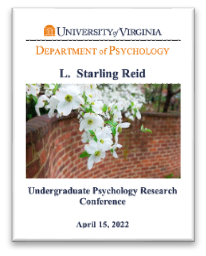
Please note: Titles and abstracts listed in the program may have slight changes. Please refer to the Open Science Folder for the latest versions.
Poster Session Directory - Morning (10:30 -11:30 AM)
Breakout Room
School, Presenters | Title
1 Baca / Iyer
- Vanguard University of Southern California, Marissa Baca | Correlates of Stress and Anxiety in College Students During the COVID-19 Pandemic
- University of Virginia, Shreya Iyer | Examining the Effect of Marijuana and Depression on Adolescent Suicide
2 Kerere / Mehta
- University of Virginia, Jordan Kerere | Prior to Serve & Protect: An analysis of pre-employment psychological evaluations in Virginia law enforcement candidates
- New York University, Anjali Mehta | The Immediate Impact of Mindfulness Meditation on Student’s Attentional Control
3 Upasani / Vachhani
- University of Virginia, Rujula Upasani | Telemedicine Interventions in Cancer: Scoping Review of Systematic Reviews
- University of Virginia, Shruti Vachhani | Better Sleep for Supporters with Insomnia Study: Preliminary Efficacy of Internet-delivered Cognitive-Behavioral Therapy
4 Isaieva / Wells
- University of Virginia, Varvara Isaieva | Finding a Needle in a Haystack: Exploratory Psychometric Analysis of Healthcare Aptitude Test Data
- University of Virginia, Rachel Wells | Behind the Public Eye: Psychometric analysis of Social Responsiveness Scale- Second Edition (SRS-2) for Autism Spectrum Disorder
5 Penn / Alperin
- University of Virginia, Jamie Alperin | Critical Historical Knowledge is Not Enough: On the Role of Perceptions and Emotions on Support for Racial Equality
- University of Virginia, Tamia Penn | Quantifying Psychosocial Factors Impacting the Health of Sexual Minority Black Women
6 Bishop / Fitzpatrick
- Vanguard University of Southern California, Makenzi Bishop | College Students and COVID-19 Stress
- St. Mary's College of Maryland, Julia Fitzpatrick | The Effects of Eye Contact on Self-Disclosure and Trust
7 Brehm / Smith
- University of Virginia, Margaret Brehm | The Power of Friendship: How Adolescent Friendship Quality Predicts Relative Power in Adult Romantic Relationships
- University of Virginia, Karissa Smith | The Long-Term Implications of Parental Emotional Support on Physical Health
8 Lerner / Q.Liu
- University of Virginia, Rachel Lerner | Measuring Concentration Through its Key Skills: Self-regulation, Focus, and Executive Attention
- University of Virginia, Qianshu (Shirley) Liu | Young Children’s Interpretations of Prosocial Behavior and Their Relationship to Parental Interpretations of Prosocial Behavior
9 Brence / Chu
- University of Virginia, Madeline Brence | The Effect of Social Resource Priming on Future Orientation
- College of William and Mary, Xiatian Chu | Friendship qualities in female-female friendships: Differences from other-gender and male-male friendships
10 McDonald / Powell
- Roanoke College, Claire McDonald | Technology Use and Need Fulfillment in Older Adults
- Roanoke College, Caroline Powell | With Friends Like These, Who Sees Enemies? Attachment, Hostile Attribution Bias, and Aggression in Emerging Adults.
11 Baker / Campbell
- Roanoke College, Kyra Baker | Emerging Adults’ Striving for Popularity & Relational Aggression: Associations with Narcissism/Perceptions of Parental Behaviors
- Roanoke College, Benjamin Campbell | Effects of Elicited Jealousy on Threatened Masculinity and Relational Aggression in Emerging Adult Men
12 Coughlin/ Parker/ Williams
- University of Virginia, Amanda Coughlin | American’s Understanding of Economic Inequality Between Racial Groups
- Roanoke College, Ethan Parker | Relational Victimization and Gender Identity as Predictors of Adjustment in Emerging Adults
- University of Virginia, Ryan Williams | Among white people, feelings of economic “inadequacy” predicts worse sleep quality over time
13 Boudreau / Hill
- W&L University, Grace Boudreau | The Role of Race, Gender, and Interest in Determining Friendships in Middle Childhood.
- W&L University, Lindsey Hill | Real Cowboys Are Gentle: Examining Gender Schema Flexibility Influencing Stereotypical and Counter-Stereotypical Careers
Poster Session Directory - Afternoon (12:30-1:30 PM)
Breakout Room
School, Presenters | Title
1 Barker / Patterson
- University of Hawaii, Max Barker | Mindful Media: A diachronic analysis of cognitive health in social media
- W&L University, Morgan Patterson | Building Fairness in Children on the Autism Spectrum
2 Leventhal / McGuinn
- University of Virginia, Emily Leventhal | Qualitative Interviews to Inform a Mobile Anxiety Intervention for a University Community
- University of Virginia, Bailey McGuinn | Detecting emotion in young adult suicide attempt survivors’ text messages with family, friends, and significant others
3 Clore / Lee
- University of Virginia, Georgia L. Clore | Associations Between ADHD and Helping Behavior in Children and Adults: Exploring the Role of Context
- University of Virginia, Justine Lee | The Effect of Psychoeducation on College Students’ Mental Health
4 Adotey / Honig
- W&L University, Chelsea Adotey | The relationship between sleep health and habituation of the cardiovascular response to mental stress
- W&L University, David Honig | The Relationship between Mental Stress and Cardiac Timing in Individuals with Anxiety Symptoms
5 Howard / Ponnapalli
- University of Virginia, Haley Howard | The Relationship Between Childhood Attachment and Adolescent Depression
- University of Virginia, Medha Ponnapalli | Correlation Between Birthweight of Twins and their Physical and Cognitive Development
6 Ananth / Rollins
- New York University, Srinidhi Ananth | Primary Caregivers' Barriers to Participating in Research
- University of Virginia, Hannah Rollins | Evaluation of Character Building Framework: EL Education: Do Students Respect the Differences of Their Peers?
7 Spinelli
- Saint Mary's College of California, Maria Gabriela Spinelli | Political Orientation Influences Perceptions of Others During COVID-19: An Application of Moral Foundations Theory
8 Brown / Gu
- W&L University, Javaneh Brown | Racial Differences Among Undergraduate Help-Seeking Behaviors and Attitudes Toward On-Campus Mental Health Services
- New York University, Janet Gu | Understanding the Perception of Racial/Ethnic Joking in Young Adults
9 Ha / Melly
- University of Virginia, Tiffany S. Ha | Perceived Differences Affect Institutional Belonging More Than Actual Differences
- University of Virginia, Sophie Melly | Assumed Confidentiality in Self-Disclosure
10 Byeon/ Monroe-Mohajerin
- University of Virginia, SooYun Byeon | The Effect of Recipient Race on 4- and 5-Year-Old Children’s Sharing Behaviors
- University of Virginia, Madison M Monroe-Mohajerin | Assessing the Impact of an Infant Sleep Schedule on Neural Noise and Cognitive Milestone Emergence
11 Albuquerque/ Ross/ Seitov
- University of Virginia, Marina Albuquerque | Specialization and Its Discontent: Job Specialization Decreases Curiosity and Psychological Richness
- University of Virginia, Arsen Seitov | Why Meeting New People is Good: Effects of Social Network Expansion on Psychological Richness
- University of Virginia, William Ross | Examining Liking and Respect Gaps in Intergroup and Same-Group Interactions
12 Canning / G.Liu
- University of Virginia, Anna Canning | Exploring the Effect of Different Emotional Conversation Topics on Nonverbal Synchrony
- University of Virginia, Gina Liu | Differences in Emotive Language using IRT modeling and Sentiment Analysis
2022 Presentation Files (Open Science Folder)
You may view the accepted talks and posters on the 2022 Reid Conference Open Science Folder (OSF)
Using Zoom - online conference program
Zoom is the online software we will use for the conference. Please be prepared:
Create a zoom account (if you don’t already have one), and upgrade to the latest version of zoom before the conference.
- Create a General Zoom Account (Non-UVA) or UVA student Zoom account
- How to update Zoom
- Participating in Breakout Rooms (You will be “self-selecting” the breakout rooms during the poster session, this shows you how)
- Tips for a good ZOOM connection
2021
2021 Program (pdf)
2021 Program Schedule (pdf)
Please note: Titles and abstracts listed in the program may have slight changes. Please refer to the Open Science Folder for the latest versions.
2021 Presentations (Open Science Folder)
You may view the accepted talks and posters on the 2021 Reid Conference Open Science Folder (OSF)
2021 Virtual Conference Schedule: April 23, 2021 (8:30am - 4:45pm)
- 8:30-8:45 Welcoming Remarks: Frederick Smyth, PhD | Director of Undergraduate Studies in Psychology University of Virginia
- 8:45-10:15 Oral Presentations I (4 student presenters)
- 8:46 Kathleen Gilmer | Rethinking the Traditional Approach to Speaking and Listening in Initial Conversations
- 9:08 Brigitte Alexis Lieu | Reducing the self versus other Liking Gap: Using Construal-Level Theory to increase perceived liking in conversations
- 9:30 Lauren Hall | Exploring the Emotional Impacts of Fatal Police Shootings of Black Civilians
- 9:52 Maya Stephens | Predicting Retrospective Emotion Recall among Suicide Attempters using Text Messages
- 10:30-11:30 Poster Session I
- 11:30-12:30 Break
- 12:30-1:30 Poster Session II
- 1:45-3:15 Oral Presentations II
- 1:46 Olivia M Walker | Knowledge Sharing Behaviors and Expectations in Professional Virtual Communities
- 2:08 Alison Goldstein | Epigenetic Modification of the Oxytocin Receptor Gene Moderates Developmental Trajectories of Amygdala Functional Connectivity and Social Interaction
- 2:30 Alexandra Tucker | The Effects of Social Media Use on Social Connectedness, Mental Health, and Risk Taking Behaviors During COVID-19 Quarantine
- 2:52 Parnia Ashari | Examining how Iranian Mother-Daughter Relationships Influence the Adult Daughter’s Psychosocial Development
- 3:15-3:20 Appreciation Remarks: Frederick Smyth, PhD
- 3:30-4:30 Keynote Lecture: Elizabeth A. Phelps, PhD | Mechanisms of Threat Control in Humans
- 4:30-4:45 Being Human in Psychological Science | Informal Q&A with keynote speaker, Elizabeth A. Phelps, PhD, about her path in psychological science. All are encouraged to turn camera’s on and participate.
Online (Zoom) Information
Attending as a Guest? Please register here.
Zoom Link | Password: Reid
Using Zoom:
Zoom is the online software we will use for the conference. Please be prepared:
Create a zoom account (if you don’t already have one), and upgrade to the latest version of zoom before the conference.
- Create a General Zoom Account (Non-UVA) or UVA student Zoom account
- How to update Zoom (watch video)
- Participating in Breakout Rooms (You will be “self-selecting” the breakout rooms during the poster session, this shows you how)
- Tips for a good ZOOM connection
Keynote Speaker: Elizabeth A. Phelps, PhD

Pershing Square Professor of Human Neuroscience | Department of Psychology, Harvard University
Mechanisms of Threat Control in Humans
Animal models of associative threat learning provide a basis for understanding human fears and anxiety. Building on research from animal models, I will explore a range of means maladaptive defensive responses can be acquired and diminished in humans. First, I will outline how extinction and emotion regulation, techniques adapted in cognitive behavioral therapy, can be used to control learned defensive responses via inhibitory signals from the ventromedial prefrontal cortex to the amygdala. One drawback of these techniques is that these responses are only inhibited and can return, with one factor being stress. I will then review research examining the lasting control of maladaptive defensive responses by targeting memory reconsolidation and present evidence suggesting that the behavioral interference of reconsolidation in humans diminishes involvement of the prefrontal cortex inhibitory circuitry, although there are limitations to its efficacy. Finally, I will describe two novel behavioral techniques that might result in a more lasting fear reduction by providing control over the stressor and introducing novelty.
- Zoom Link | Password: Reid
- 3:30-4:30 EST Lecture
- 4:30-4:45 EST Being Human in Psychological Science (Informal Q&A with keynote speaker, Elizabeth A. Phelps, PhD, about her path in psychological science. All are encouraged to turn camera’s on and participate.)
2020
2020 Accepted Abstracts
Participating students were invited to publish their talk or poster through the Center for Open Science “OSFMeetings” online platform. Please visit the following site to access participating talks and posters for the L. Starling Reid Undergraduate Psychology Research Conference 2020:
